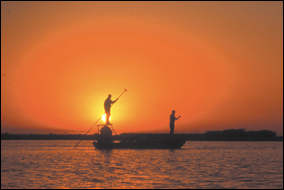
Night fishing isn't for everyone, but it's a great way to catch trout...
and beat the Texas summer heat.
By Sugar Ferris
There's a quaint, small motel located in a quiet, sleepy birding and fishing Gulf Coast known as Rockport. It has become one of my favorite places in Texas to fish, visit, empty my head and vegetate for a few days. I visit as often as possible, though not as often as I'd like.
The motel itself sits on the edge of the bay, and the rooms are built on pilings, high above the rock bulkheading. The water of the bay slaps against the rocks and lulls you into a deep trance as you listen to the shrimp boats heading out on their daily run. If you're lucky, you might even catch sight of the dolphins on their early morning run behind the boats or playing in the channel.
 No one's out, just the gulls, pigeons and me. The bay is dark gray with spots of light in a few places, like orange-pink freckles. The tide's coming in very softly, then rolling back out like someone tilted the earth, back and forth, a whoosh-shoosh rhythm. I think of something I once saw on TV; panning for gold. It's sort of like God is tilting the whole planet looking for something valuable. No one's out, just the gulls, pigeons and me. The bay is dark gray with spots of light in a few places, like orange-pink freckles. The tide's coming in very softly, then rolling back out like someone tilted the earth, back and forth, a whoosh-shoosh rhythm. I think of something I once saw on TV; panning for gold. It's sort of like God is tilting the whole planet looking for something valuable.
I stand on the back balcony of the motel, watching and listening. I think of all the people who'll never be privileged to see the beauty my eyes are now beholding. I close my eyes tight and blow out those thoughts.
I think instead of the bay, the air, how salty it smells and how I like that smell. How this could very well be on the edge of the earth. I can see it from here, and know that it is as far as you can run. There's some litter floating in with the tide - papers, beer bottles and soda cans - but everything still looks beautiful. Quiet and empty and beautiful. It helps me understand why I know that I will always like being alone.
The sky in front of me starts to brighten up and the skin of my arms turns gold and I spot the sun, rising, humongous and egg-yolk yellow. I can't feel any heat yet, but with a sun that big I know it'll be coming, and it'll be hot! When I say hot, I mean hot!
That's why we had spent the night fishing under lights on the end of the long pier that juts out into the bay. Fishing at night under lights is one of the most comfortable ways a person can beat the heat of the sweltering temperatures along the Texas Coast. It's also one of the most productive methods of catching spotted seatrout, a highly prized game fish many anglers affectionately call "specks."
Night fishing is a relatively uncomplicated method of angling, especially if you utilize one of the many lighted piers, either public or private, found along coastal regions. Of course it isn't necessary to confine your night fishing activity to the available piers and/or the catwalks which parallel highway bridges, not if you use a portable generator to provide power for your own lights or opt for a portable 12-volt florescent "Green Light." A Yamaha gasoline generator can be set up just about anywhere you feel you might be able to attract specks - or things that specks eat. The menu is the key to the successful night fishing expedition.
Just as the freshwater angler uses a gasoline lantern or dock lights to attract minnows, which, in turn, draw schools of crappie or white bass, the saltwater speckled trout angler also uses light to attract shrimp which, in turn, draw in schools of specks. Although night fishing generally is more comfortable than day fishing during the summer, this popular type of fishing is not confined to just the hot summer months. Night fishing usually becomes productive along the Gulf Coast in March, peaks in June, and continues to pay off until the first real cold spells in the fall.
At times, it can even be exceptionally good during the winter months but the angler gambles on success during this time because trout tend to make irregular appearances under lights when the water temperatures turn chilly. But, when the trout do cooperate during the winter, they are generally big ones.
Lights that are set up near deep water, like those on the Surf Court motel fishing pier, and are adjacent to a deep water channel, usually pay off at night better than those with little or no deep water in the area. Trout, red drum and flounder often hang out along canal shelves during the day then move into the shallower water, especially on an incoming tide, to feed. If you can concentrate the food for them, you can concentrate the fish for yourself.
continued
page 1 / page 2
| 




